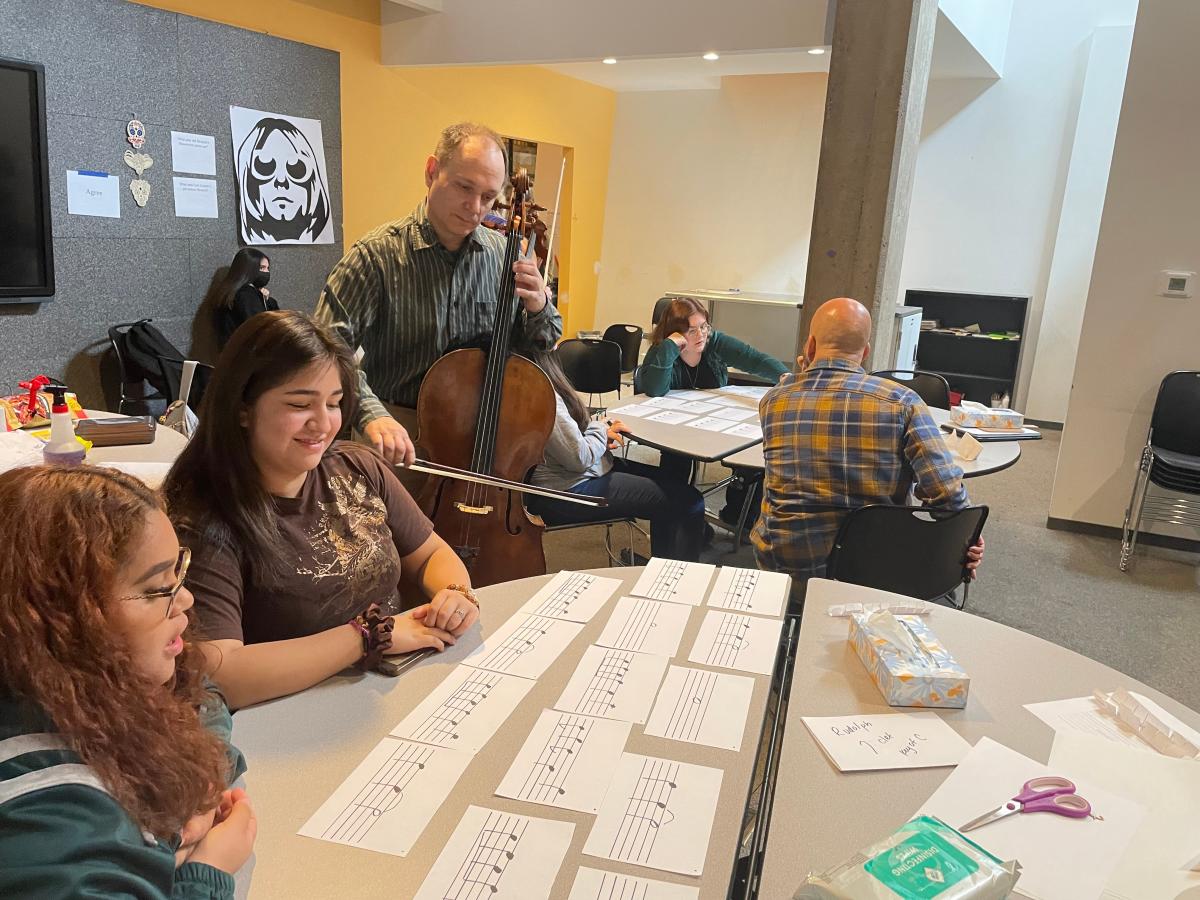
Twelve students sat in a downtown Phoenix classroom talking among themselves while three Phoenix Symphony musicians set up their instruments and readied to teach a lesson related to music theory at Hope Academy High School.
As the musicians began playing “Winter Wonderland,” the students stopped their conversations to listen.
After the performance, Tessa Gotman Bock, second violin for the Phoenix Symphony, began a lesson — about math. Gotman Bock explained the mathematical order of operations and how it is similar to the composition of a song. The lesson is part of the Phoenix Symphony’s Mind Over Music program, which started in 2015 with the goal of having teachers and Phoenix Symphony musicians collaborate to incorporate music into science, technology, engineering and math (STEM).
After the lecture, the musicians started a hands-on activity with the students. The students were instructed to arrange shuffled pieces of a song into the correct order. The musicians Michael and Dian D’Avanzo, along with Gotman Bock, helped the students along the way.
Since its launch, Mind Over Music has served Phoenix schools at all grade levels with significant low-income student populations. Hope Academy High School only has about 80 students on its campus, which helps create a more personalized learning environment. The musicians participating in Mind Over Music visit the school regularly and develop relationships with the students they teach.
The school is overseen by the Maricopa County Regional School District and has a student body ranging in age from 14 to 21. Hope Academy is an accommodation school, meaning it serves students who may not have a home address, may be without shelter or have been suspended from another public school.
“This whole job has been relationship first,” said Michael D’Avanzo, cellist for the Phoenix Symphony. “The hardest thing is to get the students to get over their skepticism, but they warm up quickly.”
The COVID-19 pandemic greatly affected the ability of musicians participating in Mind Over Music to go to schools and teach. But Valerie Bontrager, the director of education and community engagement for the Phoenix Symphony Association, said the program is regaining its traction and lessons at Hope Academy and the Academies at South Mountain are scheduled for the 2023 spring semester.
Surveys given to students at Hope Academy show that the Mind Over Music program is an overwhelming favorite. The students even made hats for the Phoenix Symphony musicians who teach at their school.
Last year, Season for Sharing raised $1.8 million and distributed it among 164 nonprofit organizations. The Phoenix Symphony’s Mind Over Music program was among those organizations. With the $7,500 grant awarded to them by The Arizona Republic, the Phoenix Symphony is able to pay the participating Mind Over Music musicians to develop and teach lessons and continue building trust with the communities they serve.
Donate to Season for Sharing: sharing.azcentral.com.
Among the other music-centered nonprofits that received Season for Sharing grants last year were:
-
Rosie’s House: A Music Academy for Children, Phoenix, $7,500: Free afterschool mariachi classes for underserved K-12 students.
-
Musical Instrument Museum, Phoenix, $7,500: To create a free virtual education program for Maricopa County children who attend under-resourced schools.
-
Hospice of the Valley, Phoenix, $7,500: To fund the Musical Comfort for Persons Living with Dementia Program.
Ways to give
-
Fill out the secure, online form at sharing.azcentral.com.
-
Text “SHARING” to 91-999 and click on the link in the text message.
-
Go online at facebook.com/seasonforsharing and look for the “DONATE HERE” post.
-
Clip the coupon on Page 4A of The Arizona Republic, fill it out and mail it to P.O. Box 29250, Phoenix AZ 85038-9250.
-
Make a donation when you buy tickets to Las Noches de las Luminarias at Desert Botanical Garden. dbg.org.
Where does the money go?
When you give to Season for Sharing, you are helping nonprofits that support education, feed the hungry and help struggling families and older adults. The Republic pays all administrative costs, so 100% of donations go back to the community.
This article originally appeared on Arizona Republic: How Season for Sharing helps low-income children connect with music